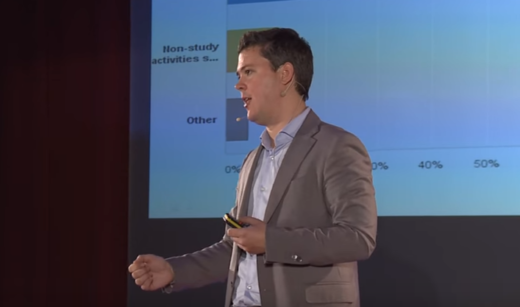Every class has students who excel and those who don't. The reasons behind academic performance are myriad, but when Douglas Barton and his team at Elevate Education set out to study and benchmark the most effective practices used by top students in Australia, the U.K., South Africa and the U.S. they found three common practices. The company has used its findings to coach students on the most effective study strategies.
Barton says 50 - 90 percent of students say IQ has the biggest impact on their ability to get good grades. Barton says his team found 13 other variables more important than IQ to predict academic achievement including things like self-discipline and self-motivation. So his first piece of advice to students is to stop worrying about IQ.
The other reason students often give for not succeeding at the level they want is that they aren't working hard enough. Barton quibbles with that assessment, saying it's not just about working hard, but rather about working hard in the right ways. Few of the top students don't work hard, but many students who work just as hard as the top students don't perform well. The reason is that they are working hard at the wrong things. Poor study skills zealously applied won't lead to better results, but are likely to lead to disengagement.
One of biggest differences between top students and everyone else was that when they study, they take practice tests. Only 11 percent of students do this, but they perform better because they are studying in a way that goes beyond memorizing material. On the flip side, most students report studying by making notes, re-reading notes, writing out notes or cramming. All these ways of studying emphasize rote memory.
Lastly, Barton says when the best students make studying schedules for themselves they first include things they like to do on their schedule and then work study time in after. This method naturally ensures that students are doing things they like to do every day in addition to studying, so they don't burn out. These balanced schedules are easier follow. In contrast, most students cram their schedules full of study times, intent on doing better, but quickly abandon the plan when they're unhappy with how little free time they have.


